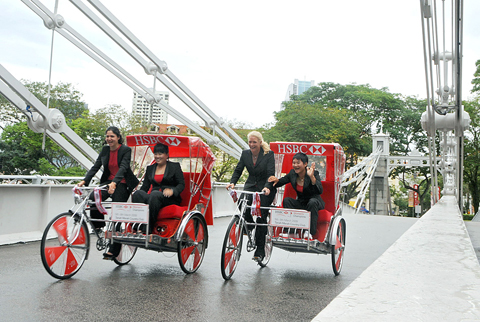Taiwan’s world No. 2 ranked golfer Yani Tseng’s (曾雅妮) recent plea to the government for help to establish a top-tier Ladies Professional Golf Association (LPGA) tournament highlights a broader problem of the utter lack of premier international sports events in Taiwan.
A comparison with the other three “Asian tiger” economies, for example, should have local sports fans crying into their beers and hurling their hot dogs in frustration.
Start with Hong Kong: It is home to top-level women’s tennis and men’s golf tournaments plus international rugby and cricket competitions. Taiwan is not.

PHOTO: AFP
It also played host to the equestrian events for last year’s Beijing Olympics and attracts big-name English Premier League soccer teams for pre-season games.
But it gets worse. South Korea teamed up with Japan in 2002 to host one of the world’s greatest sporting events, the soccer World Cup.
In contrast, in November 2007 the Asian Football Confederation (AFC) revoked Taiwan’s right to host the AFC Challenge Cup because of a failure to guarantee that it would meet the standards of Asian soccer’s governing body for the 16-nation tournament.
The Chinese Taipei Football Association (CTFA), local authorities and the Sports Affairs Council pointed the finger of blame at each other for the debacle.
CTFA secretary-general Lin Der-chia (林德嘉) told the Taipei Times the city governments in Taipei and Taoyaun refused to undertake refurbishments to bring two stadiums up to standard for the tournament.
While soccer may not be a big draw in Taiwan, South Korea also plays host to top women’s tennis and golf events and, like Hong Kong, has attracted Premier League sides, including Manchester United.
Tseng’s frustrations become more understandable when one considers that Singapore also hosts an LPGA tournament, as do China, Japan and Thailand.
On the men’s side, there is one annual Asian Tour golf event in Taiwan this year, the US$500,000 Mercuries Taiwan Masters. This compares with three in South Korea, all with more prize money on offer — five times as much, in the case of the Ballantine’s Championship on Jeju Island. The UBS Hong Kong tournament offers US$2.5 million.
In fact, tournaments in Indonesia, Thailand and Malaysia are all richer than Taiwan’s.
In terms of prize money the Taiwan Open is on a par with the Hana Bank Vietnam Masters, although it does offer more than the Cambodian Open.
Not surprisingly, the top players give Taiwan a miss.
Singapore, with a population less than a quarter that of Taiwan, also hosts a Formula One Grand Prix co-funded by its government, which footed 60 percent of the total S$90 million (US$59 million) bill, with Singapore Telecommunications sponsoring the event.
Tseng’s father, Tseng Mao-hsin (曾茂炘), estimated that the cost of staging an LPGA tournament in Taiwan would be about US$6 million.
Despite boasting two female and one male player in the world’s top 100 and some of the world’s leading women’s doubles players, the only tennis tournament of any note held in Taiwan last year was the Taipei Ladies Open, an event sanctioned by the International Tennis Federation, not a top-ranking Lawn Tennis Association (LTA) event, with prize money to match.
As a consequence, the only players in the world’s top 100 in attendance were Taiwan’s Chan Yung-jan (詹詠然) and Hsieh Su-wei (謝淑薇).
The quality of the nation’s major international basketball tournament, the annual Jones Cup, can be gauged by the fact that Jordan, ranked 42nd in the world by the International Basketball Federation, have won the last two events.
On the plus side, Taipei is this year hosting the Deaflympics and Kaohsiung the World Games, an event for sports not included in the Olympics.
While these are steps in the right direction, the global impact of the two will be minimal. How many Taiwanese sports fans will be lining up to watch boules or fistball in Kaohsiung?
Comparing Taiwan’s sports events with those in China and Japan is even more depressing, and they stack up badly with Malaysia and Thailand.
Singapore’s government has seen the value of a major sports event in putting its country in the spotlight in terms of worldwide television exposure and attracting tourists.
It’s also probably no coincidence that the LTA events in Thailand and Indonesia take place in the tourist centers of Pattaya and Bali respectively.
It is time for central and local governments, sports governing bodies and the business community to take hosting and sponsoring major sports seriously. And that means spending money.
Until events offer prize money on a par with others in the region, the stars will continue to stay away. Even worse, the few world-class performers Taiwan has may decide the grass is greener elsewhere and take up offers like those made to Yani Tseng and pool player Wu Chia-ching (吳珈慶) by China and Singapore.
The nation’s long-suffering sports fans deserve better.

Shohei Ohtani and Clayton Kershaw on Friday joined their Los Angeles Dodgers teammates in sticking their fists out to show off their glittering World Series rings at a ceremony. “There’s just a lot of excitement, probably more than I can ever recall with the Dodger fan base and our players,” manager Dave Roberts said before Los Angeles rallied to beat the Detroit Tigers 8-5 in 10 innings. “What a way to cap off the first two days of celebrations,” Roberts said afterward. “By far the best opening week I’ve ever experienced. I just couldn’t have scripted it any better.” A choir in the

After fleeing Sudan when civil war erupted, Al-Hilal captain Mohamed Abdelrahman and his teammates have defied the odds to reach the CAF Champions League quarter-finals. They are today to face title-holders Al-Ahly of Egypt in Cairo, with the return match in the Mauritanian capital, Nouakchott, on Tuesday next week. Al-Hilal and biggest domestic rivals Al-Merrikh relocated to Mauritania after a power struggle broke out in April 2023 between the Sudanese army and a paramilitary force. The civil war has claimed tens of thousands of lives and displaced more than 12 million people, according to the UN. The Democratic Republic of the Congo-born Al-Hilal

The famously raucous Hong Kong Sevens are to start today in a big test for a shiny new stadium at the heart of a major US$3.85 billion sports park in the territory. Officials are keeping their fingers crossed that the premier event in Hong Kong’s sporting and social calendar goes off without a hitch at the 50,000-seat Kai Tak Stadium. They hope to entice major European soccer teams to visit in the next few months, with reports in December last year saying that Liverpool were in talks about a pre-season tour. Coldplay are to perform there next month, all part of Hong Kong’s

Shohei Ohtani, Teoscar Hernandez and Tommy Edman on Thursday smashed home runs to give the reigning World Series champions the Los Angeles Dodgers a 5-4 victory over Detroit on the MLB’s opening day in the US. The Dodgers, who won two season-opening games in Tokyo last week, raised their championship banner on a day when 28 clubs launched the season in the US. Dodgers manager Dave Roberts shuffled his batting lineup with all four leadoff hitters finally healthy as Ohtani was followed by Mookie Betts, then Hernandez and Freddie Freeman in the cleanup spot, switching places with Hernandez. “There’s a Teoscar tax to